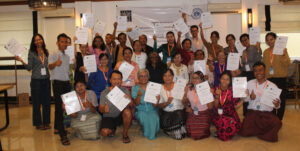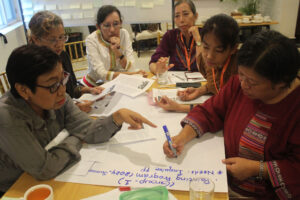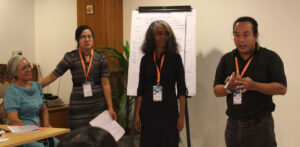Learning and growing together to achieve more impactful outcomes
12 December 2024

Myanmar Library Association (MLA), in collaboration with the International Federation of Library Associations and Institutions (IFLA), hosted a comprehensive three-day workshop on “Measurement, Evaluation, and Demonstrating Impact of Library Services”. This took place with community and public librarians, as well as university librarians in Yangon, Myanmar. The workshop was held from 6-8 December, 2024 with financial support provided by Stichting IFLA Global Libraries (SIGL).
Dr. Premila Gamage, IFLA’s Impact Trainer conducted the workshop. A total of 30 librarians; community and public librarians from different states and regional divisions around Myanmar including such as Dawei (614.3 miles away from Yangon), Ayeyarwaddy (40 miles from Yangon), Mandalay (631 miles from Yangon), Shan State (over 800 miles away) and suburban area of Yangon; and MLA newly elected Executive Committee members and university librarians participated in this workshop. The process of selection of participants was based on their dedicated work and experiences, also take into account the participant’s goals for the community.
Librarians in Myanmar carry out great programmes aimed at the development and well-being of the communities they serve, but in many cases, they do not seek to evaluate or demonstrate the value of their programs after delivery. Therefore, the main goal of organizing this workshop was to equip librarians with the skills to measure, evaluate, and demonstrate the impact of their programs on their respective communities.
The workshop began with an opening address by Patrons and President of MLA. Both patrons, and current MLA presidents, highlighted Myanmar (formerly Burma)’s long-standing relationship with IFLA, particularly MLA’s IFLA membership since 1995, and how it has contributed the development of MLA and library professionals in the country. The current President specifically mentioned how the IFLA’s Building Strong Library Association’s programme which MLA had from 2016-17 had a positive impact on MLA. Patrons and the president delivered the remarks, emphasizing the role of librarians as advocates for their libraries and building capacity for impact for the librarians in Myanmar might be urgently required.

The workshop worked through five modules: Evaluating and Demonstrating value and impact of the library services, Community Needs Assessment and Identification, Outputs and Performance, Outcomes and Impact, Evidence-based Storytelling. In each, there was a good balance between presentations, discussions and activities, with the IFLA Trainer Dr. Premila effectively explaining each module using examples and group activities to ensure comprehensive understanding among participants.
Throughout the sessions, participants actively engaged in discussions and group activities. The interactive sessions encouraged open dialogue and collaboration among the librarians. The librarians eagerly spoke out their feelings without reluctance that was the strength to open up their minds.
The workshop helped participants gain tools and techniques to identify community needs, systematically plan and deliver library services, programmes and projects, and measure and assess the change made in their targeted communities. Participants familiarized themselves with the key concepts of measurement and evaluation in library services and programmes. They also discussed strategies for effectively demonstrating library impact to stakeholders.
On the third day, the workshop helped participants to understand the value of demonstrating the change that they made to a wider community, including all relevant stakeholders and thereby advocate for libraries. This was done through a storytelling exercise where participants used their real projects that were used for other practical exercises in the workshop. The groups presented the change that they have made through their projects as stories and demonstrated how they are contributing to various SDGs.
MLA was very pleased with the active participation of the librarians and responses received. As evident from the feedback from participants, the workshop was a significant step forward empowering Myanmar librarians to assess and communicate the value of their services effectively and efficiently. There was a strong desire to bring the same lessons to the regional level within the country, to allow for learning and follow up workshop for other librarians.

Feedback
“The workshop came at perfect time in my professional journey. While I have been familiar with measuring and evaluating library services throughout my career, the workshop provided a more systematic approach to demonstrating our success stories. I now have deeper understanding of how to present our achievements not only for reporting to stakeholders but also to highlight the capabilities of librarians while supporting future planning for library services, programs, and projects. Although the program required long hours for discussion, the teaching techniques were creative and we all had valuable opportunities to practice presenting our success stories.”
— Nwe Ni Hla, Associate Librarian, Myanmar Institute of Theology
“The workshop was highly effective in enhancing librarians’ skills in demonstrating the impact of their work. Participants gained the tools necessary for improved decision-making, resource management, and advocacy for library services. By applying the workshop learnings, librarians will be able to better communicate the value of their services and engage with their communities.”
— Wut Yi Soe, Executive committee member of MLA
“Thank you for allowing me to participate in this workshop. Though I only knew its title beforehand, these three days have been incredibly enriching. I’ve learned how crucial data and statistics are in the practical world, especially for enhancing our library’s image through systematic collection and impactful demonstration. This insight has reshaped how I will design library services, ensuring they measure and reflect real impact. The workshop has also boosted my confidence in submitting a proposal before December 25, a challenge I had been anxious about as only 8 out of 60 projects will be selected. Inspired by the knowledge gained here, I am determined to craft a strong, SDG-based success story supported by solid evidence”
— Thida Htway, Librarian, Summer Shelter Library, Taunggyi, Shan State.
“The workshop had enormously helped us to continue our work in a different manner.” — Dr. Yin Win Htike, Librarian, Universities’ Central Library
“This is the first time we heard about the ‘logic model’ which we think we can apply to produce effective results. Now we understand that we have stopped and are satisfied at the ‘Output’ stage. It is not enough. We will take the other two important steps ‘Outcome’ and ‘Impact’ in our future programmes.”
— Group of community library participants
“The workshop taught me to think differently when introducing services and implementing new programmes. Additionally, the three-day workshop was the best place for us to network.”
— Soe Wai Han, Walking Book Mobile Library
“What I gained from the workshop were insightful thoughts on how to measure the collected data and how we can assess the impact of our services using performance indicators. In the past, when I did the library services and program, I was in little knowledge about community needs assessment, and the performance indicators. I will definitely apply the vast knowledge in the upcoming programs and share it with my colleagues to demonstrate the library impact to stakeholders.”
— Poe Ei Zar, Program manager/Librarian of Maubin Community Development Center
“Really appreciated the hands-on approach and found the sessions highly relevant.”
— Khin Mar Phyu, Public Library
Next steps
In addition to translating the modules into Burmese, MLA is planning to revise its curriculum soon to add the five modules of “the impact of library services” to the advanced course that the MLA is conducting for paraprofessionals and library workers. MLA already had preliminary discussions with the Emeritus professor from Diploma in Library and Information Science (DLIS) of the University of Yangon who participated in the workshop to persuade the faculty members for including these modules in the diploma course conducted by them.
Myat Sann Nyein
President of the Myanmar Library Association
This work was made possible by the financial support of Stichting IFLA Global Libraries (SIGL). SIGL was created by IFLA and the Global Libraries Programme in order to administer the Legacy Grant awarded to support IFLA’s work by the Bill and Melinda Gates Foundation.